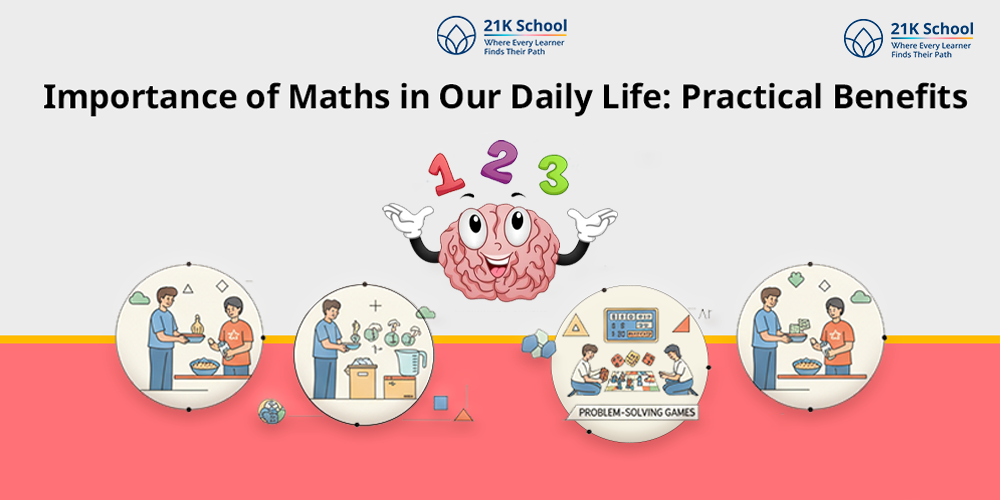
Can we really imagine a world without maths?
The logical concepts, calculations, spatial relations, all of which make our life livable would be absent if we didn’t know maths.
Maths can bring practical essence into our lives. That’s why you need to know how to learn maths easily.
Beginning from our daily activities like cooking, going out, managing salaries, shopping, to utilizing professional privilege, all comes under the beneficiaries of maths.
Here, in this article, we will be discussing more on what maths means, and the importance of maths in our daily life.
Table of Contents
- What is Maths in Our Daily Life?
- Importance of Maths in Our Daily Life
- 1. Daily Routine Activities
- 2. Finance and Money Management
- 3. Cooking and General Household Management
- 4. Helps in Achieving Educational goals
- 5. Improves Logical Thinking
- 6. Helps in Easy Traveling
- 7. Aids in Cognitive Development
- 8. Makes You Career Ready
- 9. Helps in Professional Tasks
- 10. Enhances Problem-Solving Skills
- Conclude It All
What is Maths in Our Daily Life?
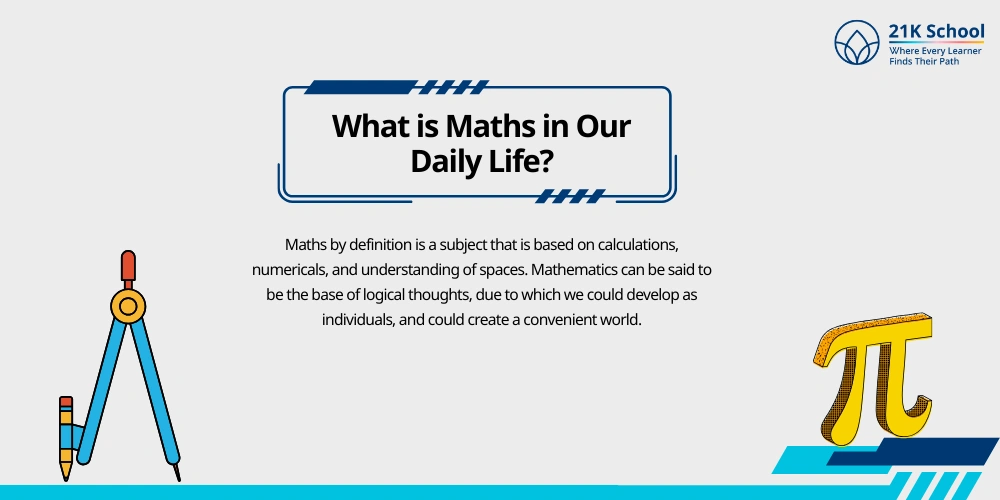
Maths by definition is a subject that is based on calculations, numericals, and understanding of spaces.
Mathematics can be said to be the base of logical thoughts, due to which we could develop as individuals, and could create a convenient world.
The word mathematics has its origin in the Greek word “mathema” which meant “learning or knowledge”.
In our daily life, maths becomes a crucial part of our lives. Whether it is while making delicious recipes, dealing with clients, managing payments from clients, or building roads, we are surrounded by mathematical components.
Importance of Maths in Our Daily Life
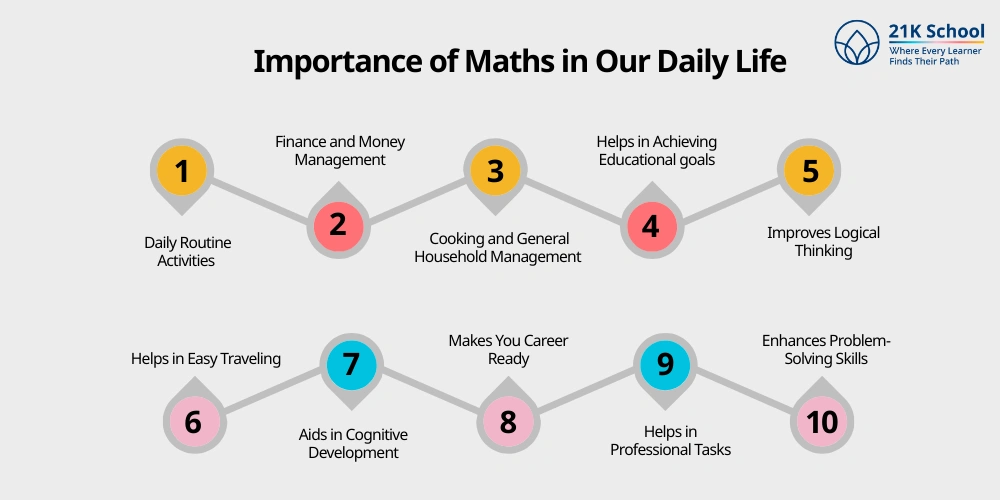
Though maths covers almost every aspect of our life, here’s the list that shows the importance of maths in our daily life.
1. Daily Routine Activities

Maths is part of our daily existence from the moment we get up in the morning to when we sleep.
Time management, counting, and estimation are some of the items of setting time, scheduling, planning our meals, and even exercising.
Using the example of wanting to get out of bed at 8:00 AM and taking 45 minutes to shower, dressing up, and be ready you would calculate that you should wake up by 7:15 AM.
The calculation of time, arranging the events done in the sequence, and assigning priority to any activity are simple to understand with numbers and time.
2. Finance and Money Management
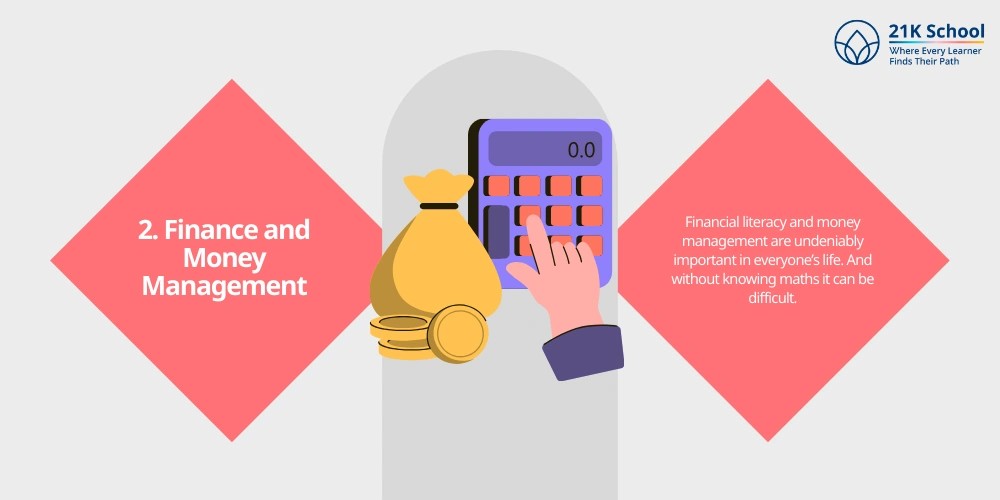
Financial literacy and money management are undeniably important in everyone’s life. And without knowing maths it can be difficult.
From planning a budget for your home expenses, travel, and utilities, to calculating profits and losses in business, everything revolves around mathematics.
If you really want to be capable of meeting the needs for your family and manage their expenses efficiently, having the best hold with taxes, discounts, loans, and investments, are all necessary.
3. Cooking and General Household Management
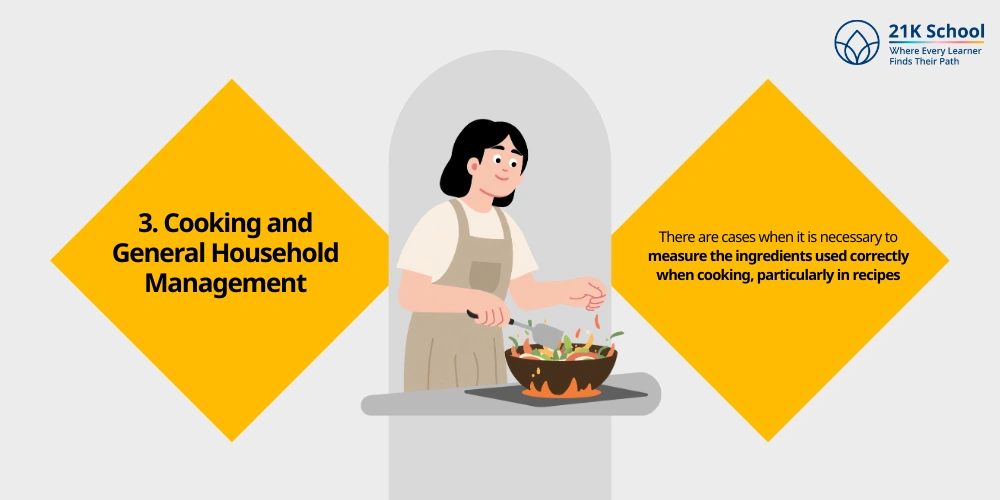
There are cases when it is necessary to measure the ingredients used correctly when cooking, particularly in recipes.
Simple arithmetic is required to know how much quantity is needed to make the best recipes and how much would be required for your family to be fed.
Maths is also needed in household management such as shopping for groceries, watching electricity bills, and tools used to manage household chores effectively.
4. Helps in Achieving Educational goals

Maths is a mainstream subject in most of the educational educational curricula.
Maths is commonly a good subject that will make one succeed in school, particularly because it aids in other subjects such as science, economics, and technology.
Those students who are able to understand simple maths at a younger age are better placed in handling subjects that are more complex.
Also, the standardized assessments may have mathematical reasoning elements, and most scholarships or academic streams may be subjected to good maths scores.
5. Improves Logical Thinking
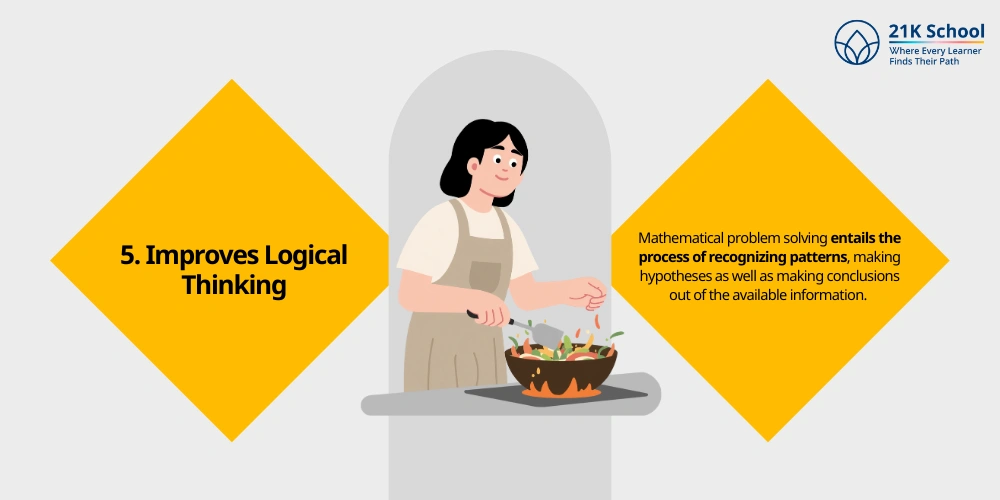
Maths stimulates logical thinking and order of thinking.
Mathematical problem solving entails the process of recognizing patterns, making hypotheses as well as making conclusions out of the available information.
Such thinking is applicable in the field of maths and also in everyday decision-making skills.
It could be argued that, when you are trying to arrive at the quickest way to get to work, you take time, distance, and traffic into account logically, therefore solving a real world problem.
6. Helps in Easy Traveling

Maths plays a big role in traveling as it would be needed to estimate the travel time, calculate distances, and also to convert currencies or know the time zones.
Reading maps or a navigation app is totally based on geometrical concepts and spatial knowledge.
Travel planning also puts you in a position where budgeting of tickets, accommodation, food costs comparisons are involved. And thus, you would have to use maths in its planning and implementation.
7. Aids in Cognitive Development
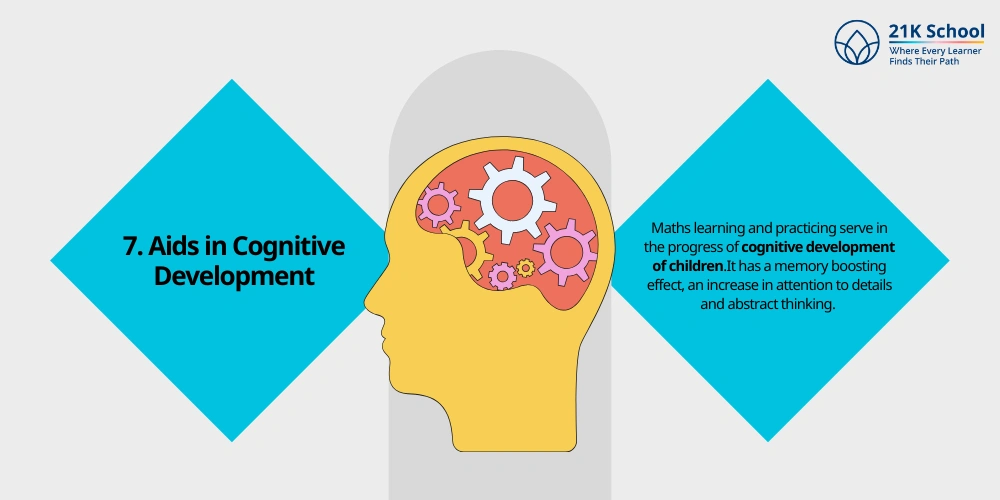
Maths learning and practicing serve in the progress of cognitive development of children.
It has a memory boosting effect, an increase in attention to details and abstract thinking.
Children who are introduced to maths in their early age can tend to be more convincing in problem solving as well as being mentally open minded.
Even during adulthood and old age, the brain can be kept sharp and active with good mathematical exercises, lowering the risk of cognitive decline.
8. Makes You Career Ready

The majority of careers are dependent on elementary knowledge in maths.
For example, geometry and calculus applied by engineers and architects, or financial analysts and accountants involved with accounting and statistics.
Even the algorithms and logical reasoning used by data analysts and IT specialists, and proportions and measurements applied by the artists and designers are all components of mathematical knowledge.
Good understanding of maths can give one access to various satisfying future jobs in the 21st century.
9. Helps in Professional Tasks

In the workplace, maths is important in the analysis of data, establishing goals, project management, and strategic planning.
Maths has its application in business to predict sales, profitability, the market, and performance.
Spreadsheets, graphs, statistical analysis, and other mathematical tools are among the tools that professionals use to address complicated issues and grow.
10. Enhances Problem-Solving Skills
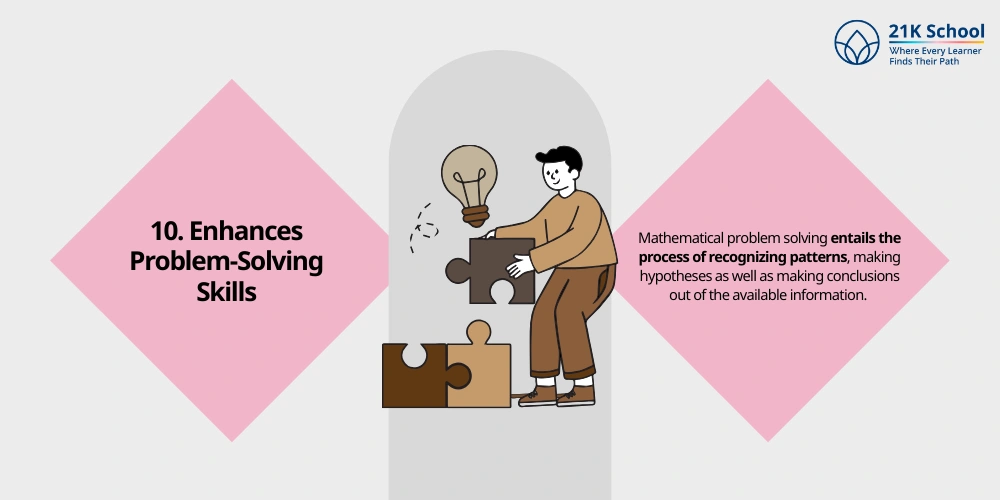
The best perks of maths are that it can be used to enhance problem solving skills.
It can be calculating in what ways you will lower your monthly bills, trying to figure out the best way to get to a business meeting on time, or choosing one product or the other.
Maths trains you to think methodically on the issues.
Problem-solving techniques might include calculation skills for comprehending the problem.
The variables of an issue, analyzing the potential outcomes, and coming up with the best decision relying on the reasoning of best judgment can also be called the works of maths.
Conclude It All
Being really aware of the importance of maths in our daily life is important for everyone.
That is why, a child from a very young age is motivated to learn mathematical uses and components.
Mathematics is so much more than a subject that we study in schools because it shapes the way we live, covering our food preparations, budget making, and traveling.
Now, if you are smart enough you would know that studying mathematics is not a choice, it’s a necessity, especially for your kids.



